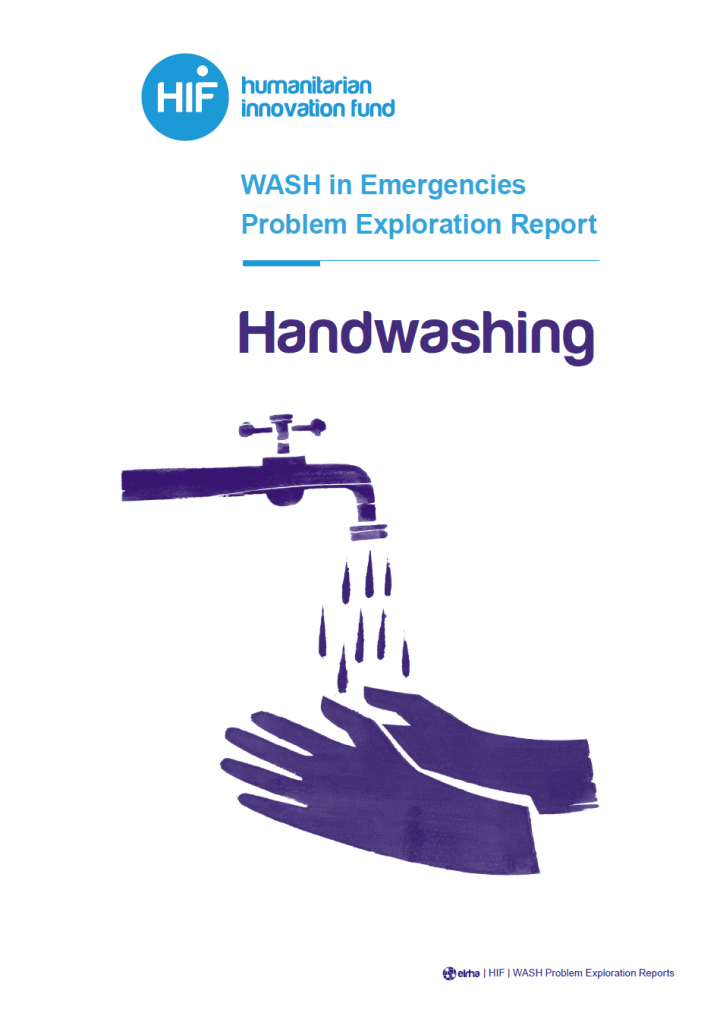‘Handwashing’ - WASH in Emergencies - HIF Problem Exploration Report
Ramos, M., Benelli, P., Irvine, E. and Watson, J. (2016)

Published in: 2016
Pages: 41
Publisher:
Humanitarian Innovation Fund (HIF)
Author:
Ramos, M., Benelli, P., Irvine, E. and Watson, J.
Uploaded by:
SuSanA Admin
Partner profile:
common upload
841 Views
4 Downloads
The promotion and uptake of effective handwashing practices are critical in ensuring the health of populations affected by emergencies and humanitarian crises. Along with general public health benefits, handwashing can reduce the risk of diarrhoeal disease by up to 50% (Curtis and Cairncross, 2003; Fewtrell et al., 2005; Luby et al., 2005). Handwashing with soap is recognised as an easy, effective and affordable method to protect and prevent disease transmission and should be achievable, even in emergency settings. However, handwashing practices in humanitarian crises are often found to be deficient and less effective than expected programming, with many socio-cultural, technical and financial factors likely contributing to the problem.
Access to, and implementation of, appropriate handwashing technologies are recognised as significant barriers to the uptake of effective handwashing practices in emergencies. Even with the existence of handwashing stations such as BushProof water containers, Oxfam buckets, the Tippy Tap, the Handy Wash and emerging technologies such as the Spa Tap and LaBobo (also known as the Happy Tap), hurdles still exist. Key challenges that impact on the effectiveness of existing handwashing technologies or ‘hardware’ include, but are not limited to: unreliable access to water and soap (including issues of soap theft), prioritisation of distributed soap or purchased soap for laundry, bathing and dishwashing over handwashing, insufficient drainage around handwashing stations, and handwashing stations that break easily or are difficult to use (International Rescue Committee, 2011; Oxfam, 2011;
Brown et al., 2012; Curtis, 2011).
For optimal engagement and investment, innovative, exciting and ‘fun’ solutions are often deemed most effective, have the greatest ‘buy-in’ and will most likely ensure a sustainable uptake. While devices with running water may be preferred in certain contexts, it is important this does not result in wet feet. This is a deterrent to washing hands and can potentially violate ‘do no harm’ principles (i.e. where conditions such as hookworm or dermatological conditions of the foot may develop).
In order to achieve greater public health benefits associated with good handwashing practices, WASH actors need to identify and apply collaborative and sustainable methods to improve handwashing solutions and promotion for those affected by emergencies and humanitarian crises. The present research puts forward three exploration areas which would benefit from additional attention.
Bibliographic information
Ramos, M., Benelli, P., Irvine, E. and Watson, J. (2016). ‘Handwashing’ - WASH in Emergencies - HIF Problem Exploration Report. Humanitarian Innovation Fund (HIF)
Filter tags
English Politicians and local decision makers Practitioners















